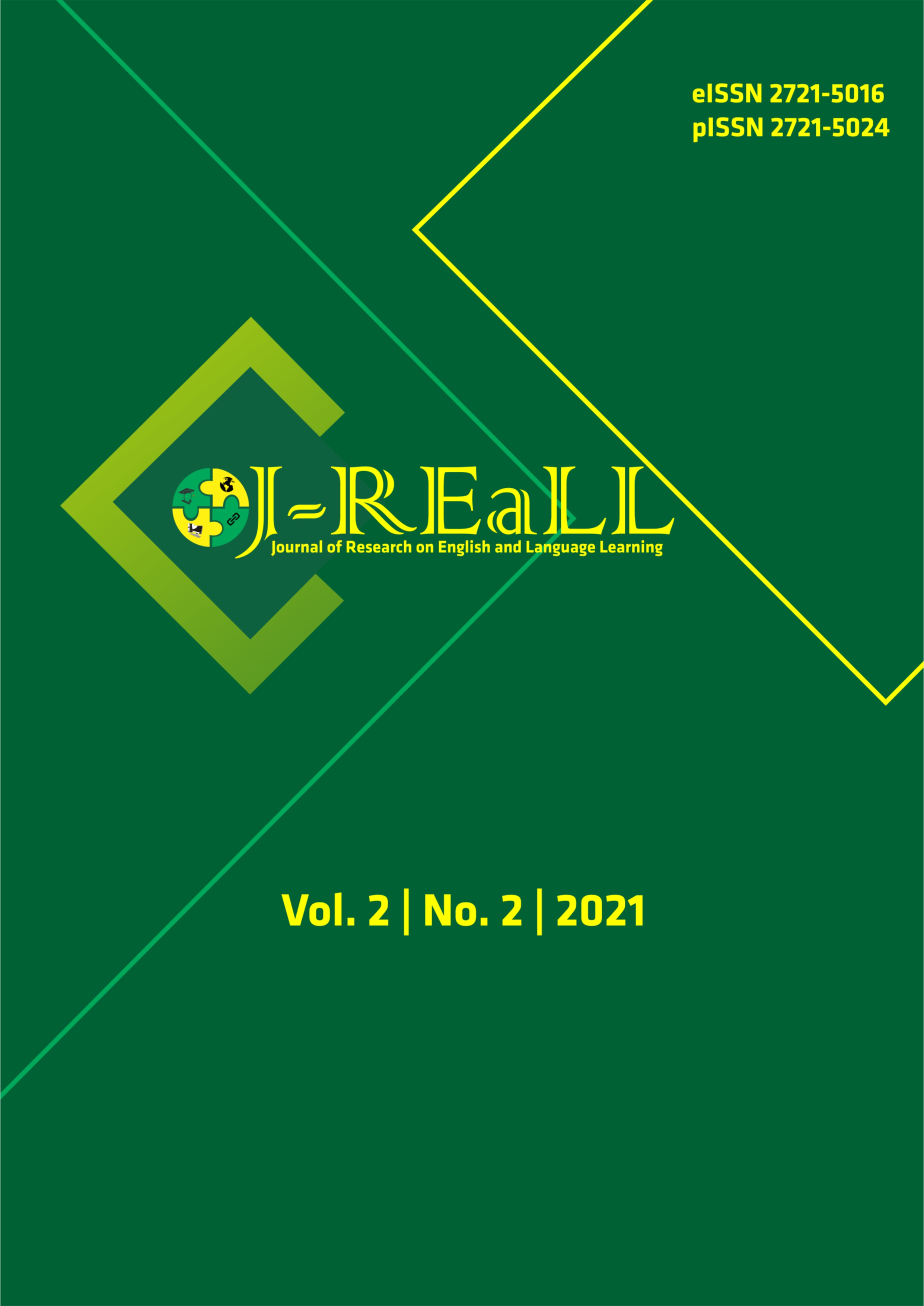The impact of the walking dead video game on students' reading comprehension on narrative text
DOI:
https://doi.org/10.33474/j-reall.v2i2.11324Keywords:
video games, reading comprehension, narrative textAbstract
With the development of technology every time, the development of media for learning is also overgrowing. Many new media are popping up especially digital-based media, ranging from images, audio, and video. All of that media has been widely used by teachers to get students excited about what they will learn in class. However, the longer these media feel boring for students, the teachers also have to twist their brains to find new media, one of which is video games. Several studies have looked into the influence of adventure video games on learning English; however, few studies have looked into the effect of adventure games on learning English. This study aimed to see how video games affected students' reading comprehension of narrative text. The study consisted of 50 students from SMA Negeri 1 Kebomas Gresik in tenth grade. X-IPS 1 and X-IPS 2 were the class examples. The impact of video games can be reflected in the multiple-choice scores of students. The author used a quantitative procedure and quasi-experimental design as the analysis methodology with a purposive sampling approach. A multiple-choice test was used as the testing tool. The findings in this study explain that video games do not significantly impact students but only increase the motivation of students to learn and entertain students only
References
Bacalja, A. (2018). What Critical Literacy Has to Offer the Study of Video Games. Australian Journal of Language and Literacy, 41(3), 155.
Barr, M. (2018). Student attitudes to games-based skills development: Learning from video games in higher education. Computers in Human Behavior, 80, 283-294. https://doi.org/10.1016/j.chb.2017.11.030
Butler, Y. G. (2015). The use of computer games as foreign language learning tasks for digital natives. System, 54, 91-102. https://doi.org/10.1016/j.system.2014.10.010
Chen, H. J. H., & Yang, T. Y. C. (2013). The impact of adventure video games on foreign language learning and the perceptions of learners. Interactive Learning Environments, 21(2), 129-141. https://doi.org/10.1080/10494820.2012.705851
Chu, PH. and Chang, Y. (2017). John W, Creswell, Research Design: Qualitative, Quantitative, and Mixed Methods Approaches. Journal of Social and Administrative Sciences, 4(June), 3-5.
Connolly, T., Standfield, M., & Boyle, L. (n.d.). Games-Based Learning Advancements for Mult - Thomas Connolly.
Costikyan, G. (2002). I Have No Words but I Must Design: Toward a Critical Vocabulary for Games. Computer Games and Digital Cultures Conference, 9-33. Retrieved from http://scholar.google.com/scholar?hl=en&btnG=Search&q=intitle:I+Have+No+Words+&+I+Must+Design+:+Toward+a+Critical+Vocabulary+for+Games#0%5Cnhttp://andrey.savelyev.2009.homepage.auditory.ru/2006/Ivan.Ignatyev/DiGRA/I Have No Words & I Must Design_Toward a
Djaouti, D., Alvarez, J., Jessel, J.-P., Methel, G., & Molinier, P. (2008). A Gameplay Definition through Videogame Classification. International Journal of Computer Games Technology, 2008, 1-7. https://doi.org/10.1155/2008/470350
Hamari, J., Shernoff, D. J., Rowe, E., Coller, B., Asbell-Clarke, J., & Edwards, T. (2016). Challenging games help students learn: An empirical study on engagement, flow and immersion in game-based learning. Computers in Human Behavior, 54, 170-179. https://doi.org/10.1016/j.chb.2015.07.045
Healy, C. (2002). Reading: What the Experts Say. Parent Educational Advocacy Training, 1-3.
Maciejewski, M. L. (2020). Quasi-experimental design. Biostatistics and Epidemiology, 4(1), 38-47. https://doi.org/10.1080/24709360.2018.1477468
Mayer, R. E. (2019). Computer Games in Education. Annual Review of Psychology, 70(1), 531-549. https://doi.org/10.1146/annurev-psych-010418-102744
Parsayi, F., & Soyoof, A. (2018). Video games: The interface between langugae learning and storytelling. International Journal of Pedagogies & Learning, 13(2), 103-118.
Permatasari, D. (2013). English Language Teaching Forum The Use of Video as a Medium to Improve Students' Ability in Writing Narrative. English Language Teaching Forum, 2(1), 1-11.
Ranalli, J. (2008). Learning English with the Sims: Exploiting authentic computer simulation games for L2 learning. Computer Assisted Language Learning, 21(5), 441-455. https://doi.org/10.1080/09588220802447859
Reinders, H. (2012). Digital Games in Language Learning and Teaching. In Digital Games in Language Learning and Teaching. https://doi.org/10.1057/9781137005267
Reinhardt, J., & Sykes, J. M. (2014). Digital game and play activity in L2 teaching and learning. Language Learning and Technology, 18(2), 2-8.
Stenros, J. (2017). The Game Definition Game: A Review. Games and Culture, 12(6), 499-520. https://doi.org/10.1177/1555412016655679
Downloads
Published
How to Cite
Issue
Section
License
Copyright (c) 2021 Muhammad Husnun Nadhif

This work is licensed under a Creative Commons Attribution 4.0 International License.
Authors who publish this journal agree to the following terms:
- Authors retain copyright and grant the journal right of first publication with the work simultaneously licensed under a Creative Commons Attribution License that allows others to share the work with an acknowledgement of the work's authorship and initial publication in this journal.
- Authors can separately make additional contractual arrangements for non-exclusive distribution published by the journal (e.g., publish it in a book), with an acknowledgement of its initial publication in this journal.
- Authors are allowed and encouraged to send their work via online (e.g., in the institutional repositories or their website) after published by the journal.






















